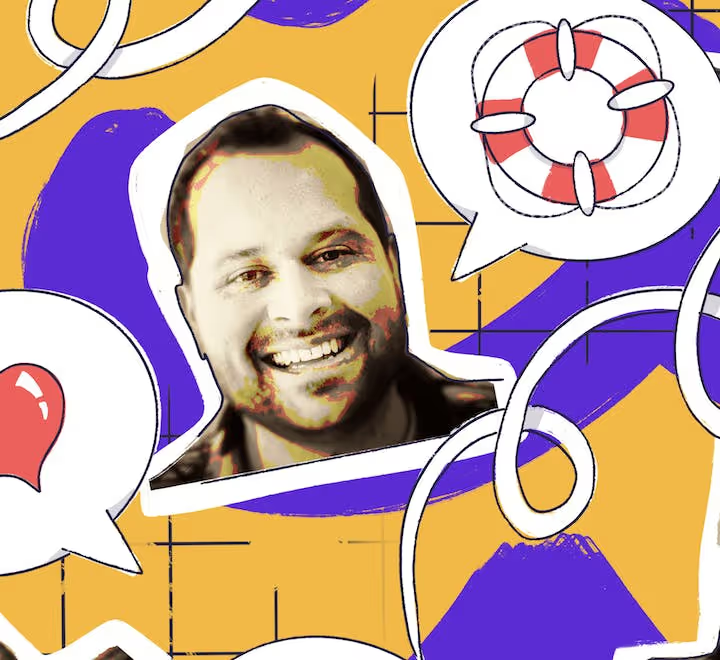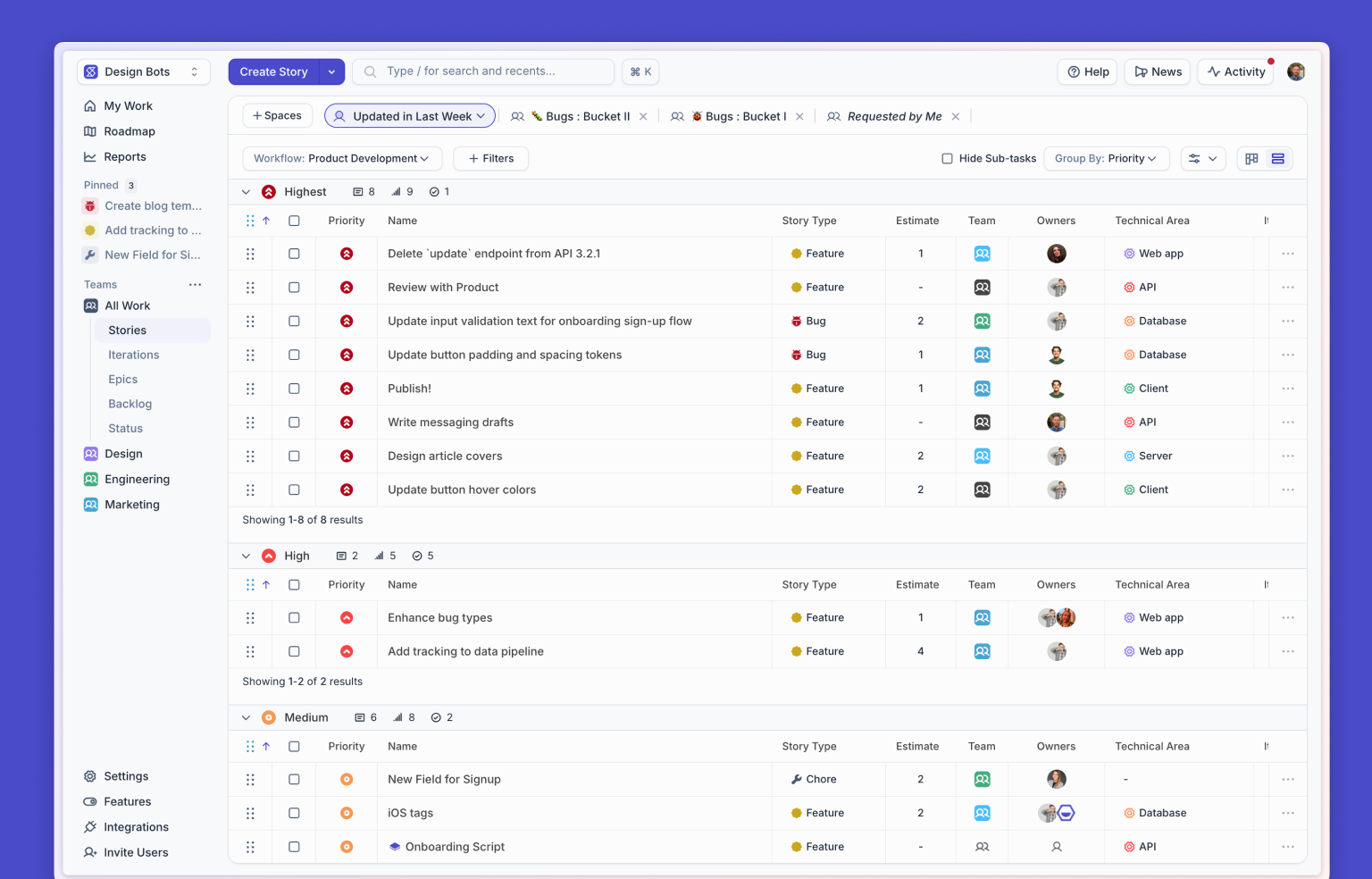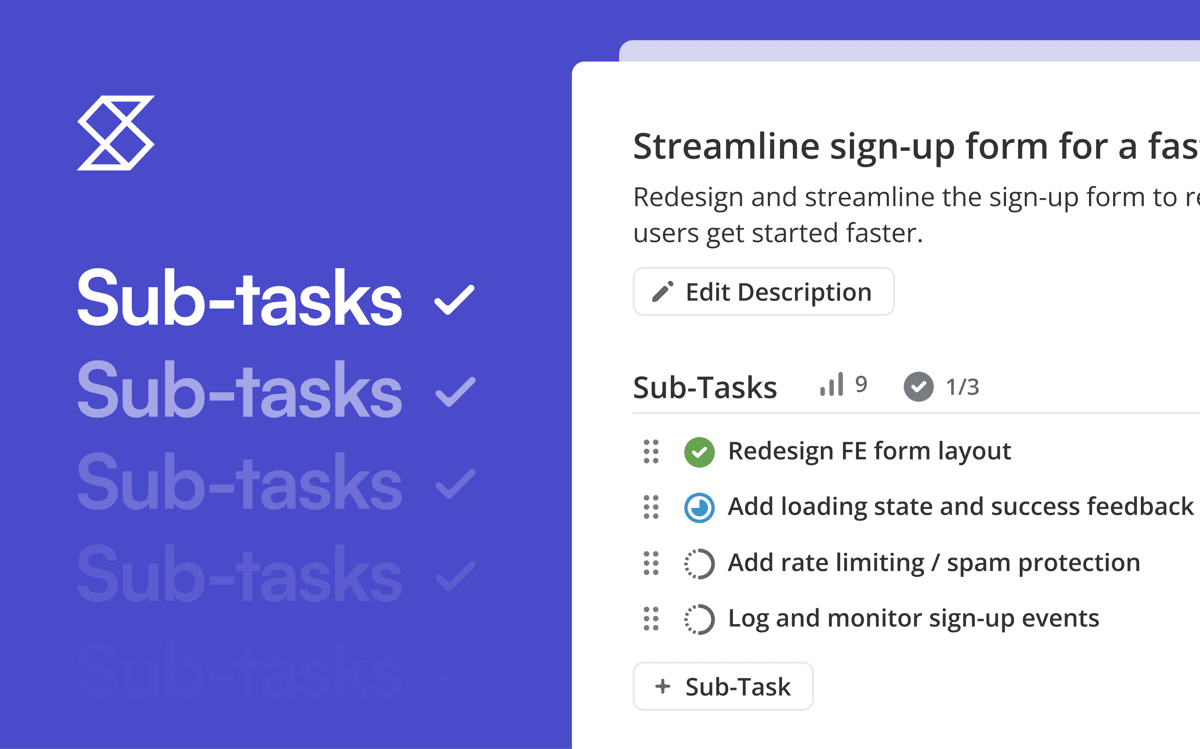Welcome back to Taking a Shortcut, a series where we interview our colleagues. The order in which we interview them is random, but that randomization is based on knowledge passed on by our Director of Content. He lives backwards through time; from his perspective we're deleting posts from the site as we go. This gives him incredible insight into the order these should be posted for all those folks who traverse through time in the normal direction. Also, from his perspective, technology is getting worse and worse as he ages. Ask him about virtua-toasters if you get a chance.
These interviews are meant to provide a glimpse into what it's like to work at a remote first company, while also exploring the topics of hiking, traversing the world in an RV, and then hiking some more. For this week's edition, we spoke with Rob.
Talk a bit about your background and how you ended up at Shortcut.
I’m the Customer Support Lead. Our team helps customers, whether it’s with questions or bugs or feature requests.
My journey to Shortcut started at my last company. We actually used Shortcut there. They had to reduce their team sizes and let a lot of people go. Their Shortcut account manager reached out to the VP of Product to ask why they had reduced their numbers, and whether Shortcut could do something to help reduce the churn and gain those customers back.
That VP said, "No, we had to let people go from every department. Here's a list of them. If you want to hire any of them, they're great people." That's how I met Bridget (Shortcut’s VP of Customer Support), then started an informal interview process and eventually got the job.
Something that’s stuck out to me is that a lot of folks who work here used Shortcut in the past and thought, "This is a place I'd like to work. I should check and see if they have any jobs."
Was that the case for you? Did you really enjoy using Shortcut? I guess you would have to say yes now, you can't say no.
I'm going to say no anyway, but only because Shortcut isn't made for support teams. That was even more true then. The way it was proposed to me from my manager, no shade thrown to her, she's a fantastic person, but it was used to help her manage my work and get visibility into what I was doing. I think for her it was like, "Let's just put everything in Shortcut." Tasks, big things, little things, just so she could see what we were doing.
For me it was interesting because when I joined I had no idea what Shortcut could do beyond what I had used it for. It was a big learning curve for me to fully recognize, "Okay, now I see why people like Shortcut!"
If someone who runs a Support team came to you and said, "We use Shortcut at my company because it’s useful to engineering and product, and we just want to put everything in one place." What advice would you give them?
I think from the support side, we can create backlogs very easily by tracking feature requests, or bugs, or paper cuts, or things that look like bugs, but are actually feature requests. I think going into that with a very intentional process to say like, "Okay, what is the key information we can bring to product and engineering?"
Don’t just dump everything in there, but think about how you can leverage it to collaborate with other teams.
Exactly. I've always learned that the easiest way for support to work with other teams is to be a chameleon. If engineering and product use a tool that we have access to, let's find a way to use it too so that at least when we talk to them via that product, it's in a world and a language they understand. It's not like, "Hey, look at this whole new product, and this whole new workflow, and this whole new learning curve," just for me to tell you that I want X created in the product. For us, it's nice because we use Shortcut and we make Shortcut so we get that input and understanding very easily. The team here is very supportive of us hitting those roadblocks and asking questions like, "Why can't we do this?" or "Why isn't this functionality part of the feature set?"
You just gotta help us, help you, help Shortcut, help us to help you. It's simple.
Very simple. You work from home, and you've always done so while at Shortcut. Tell us about where you're at and why you like working from home.
I've been working from home for about five years now. Portland, Oregon is my home base. I don't necessarily love the term digital nomad, but I like the idea that if all you need is an internet connection and your laptop, you can work from anywhere.
We have an RV and we like to travel around in that as much as we can. I’ve also lived internationally a couple of times and loved to visit old friends and catch up with people, so if I have the option to leave this home, I will. While I do work from home, I guess the term "home" to me is very loose.
Your home is wherever you happen to be.
My home is where I'm logging in. Praying that the internet connection is good.
If you're in the RV traveling around, how do you maintain a good internet connection?
Right now we tether off our phones. Tethering has worked for everything we need, because we try to go to national parks and get away from the cities. We also go into the towns and find public libraries or coffee shops, different hotspots. That usually works just fine, and gets us out of the RV. Going into a town to work from a coffee shop is sometimes the perfect release from small living and confinement.
We also do a lot of research before we go. We map locations to where there’s cell tower coverage, and then we make sure to have two or three backups. We know that there's a big brand coffee shop or something that we know will have internet if tethering isn’t working. We prepare for the worst.
I could never do it because I have no sailing skills of any kind, but I've always wanted to live on a boat so I could just sail from port to port. It's similar to just having a RV. You have this place of comfort, you have this place that's yours, but then you open your door and it's a new place every week. That's very romantic.
It is. I think that hits the point exactly where when you work, you work, like that doesn't necessarily change, but when I go out for lunch or if I go out for dinner, it's pretty cool to be able say, "I'm going to go have dinner while looking at Bryce Canyon National Park in Utah," or "I'm going to go take my lunch-break, which is actually dinner time in Zagreb, going out to the restaurant down the street." I think that experience is what makes me doubt I will go back to an office full-time anytime soon.
What are your favorite places that you’d return to again and again if you could?
In the RV, I'd say Utah. Utah's just a phenomenal state that I'd love to go back to, but I also want to do more of Montana, Wyoming, and Colorado on a different trip. Southern California, when you want sun and sand, it's always sunny and always sandy. It's kind of a win-win when you're out there. Food is fantastic. I think the natural beauty of Utah, I knew it was a beautiful state. I'd been there before, but it just continues to amaze me and traveling through it at a slow pace and not a five-day road trip where you're trying to see everything you possibly can.
What about outside of the RV?
I have a friend who I used to work with back in the day and she moved to Morocco. I got into this weird pattern of visiting her once a year, for three or 4 years in a row. It's such a different world and culture. She does tours out to the desert with her husband who is Moroccan and she's a yoga instructor. It's this different way of living that I love. That's one place I would love to go back to. I think also Turkey, or anything in the Middle East region, I want to go to.
When you're not traveling, how do you like to spend your time?
Hiking. If I'm going to go outside, I'm trying to find a hike or get away from Portland. Portland is such a cool city, but I think the best part about it is its location to hiking and the Cascade Mountain Range and just within two hours are some of the most phenomenal hiking I've ever seen. Colorado probably is one of the only states I know of that can truly compare to the mountains and the rivers and the lakes here.
Seems like you love to be wandering around, whether it's sightseeing or driving or what have you.
Yes, I've struggled to grow roots and maintain roots. The one time that I did and very happily told my father, "Look at me. I've bought a home in Portland. I've established my life here." Within eight months, I moved to Ireland. It's been a struggle for me to truly stay still. I love traveling. I love moving around and remote life and jobs that allow working from home or working remotely have made that even more accessible and more feasible.
What advice would you give to someone who's new to working from home?
I'd say first, do a bunch of research on what other people do and then don't follow it all. Everyone is different. Personally, I move around a lot. I'll work from my desk. I'll go take my laptop onto the couch and look out if the sun's hitting a chair nicely and I want to sit in the sun, I'll go do that. If I want to go sit outside, I'll take a chair and table outside. When I'm tired of my laptop, I'll read Slack messages on my phone. I move around both location and device just so I don't get stuck doing one thing constantly. But that’s just me.
I know other people who need a home office. They need the door shut, they need legitimate office hours at home. I think understanding that you can do as much or as little as you want to make it work for you. Someone I knew of made an outdoor standing desk. I was like, "That's a really good idea. I should try that out!” And I did, and I hated it. It was too glary. I was distracted because I was standing outside with my dog, and I’d rather play with my dog.
What's something that you've learned at Shortcut?
I think it's something I've learned in the past, but it's been reinforced here and it's to trust the people you hire. If you hire someone and have to micromanage them, or if you hire them and you don't understand that you hired them because of their skill set, you're going to struggle when it comes to remote work. What I've learned here, especially with my manager, and just the leadership team in general, is to just get your shit done and you're good. They don’t want to know what you're doing every 25 minutes.
Just allowing teams to work in the way that works for them, whether that's more flexible hours or traveling around and taking mornings off to go do this or afternoons to do that, I think Shortcut is super supportive. It's nice to see companies hire and trust people, to walk the walk instead of just saying that they do while asking for constant / strict updates.

















%20(788%20x%20492%20px)%20(1).png)
.png)

